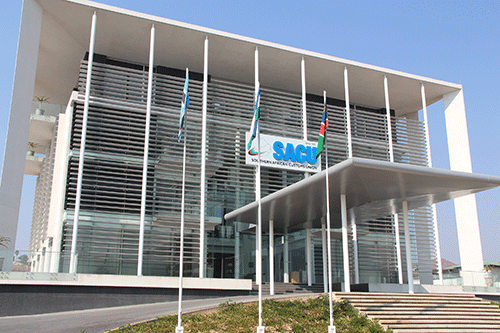The Southern African Customs Union (Sacu) member states have agreed to refocus the bloc’s work programme on industrialisation through the development of regional value chains, export, and investment promotion. Speaking at the 7th Summit of Heads of State in Bostwana last week, Executive Secretary Paulina Elago noted that Sacu has prioritised, financing for industrialisation, trade facilitation and logistics together with the implementation of the African Continental Free Trade Area (AfCFTA) as key focus areas.
“This refocused Work Programme is deliberately structured to ultimately position Sacu as the manufacturing and innovation hub for the continent, and in doing so, to take full advantage of the AfCFTA,” said Elago at her last Sacu summit, given her term of office ends in October 2022.
Regarding industrialisation, she noted that Sacu seeks to deepen regional economic integration through the development of regional value chains. To guide this work, Sacu member states have adopted a vision for industrialisation which seeks to “build a diversified, competitive, sustainable and equitable industrial base that supports structural transformation and the economic integration of the Sacu region”.
Elago explained that to attain this vision, priority sectors have been selected based on their potential to benefit the region, the opportunities they present and their overall contribution to economic development. These sectors are agro-processing; textiles and clothing; cosmetics and essential oils and pharmaceuticals.
Said Elago: “We successfully convened sectoral roundtables and analysis on these priority sectors, which culminated in a ministerial investment roundtable held on 12 to 13 April 2022, in Gaborone, Botswana, to showcase and profile the region’s development potential as well as investment and export opportunities in these sectors.”
She continued that in the area of trade facilitation and logistics, Sacu seeks to create a seamless trade environment for cross-border movements. This is being done through the application of emerging technologies to streamline processes, and enhance collaboration, whilst also detecting and deterring illicit trade in goods within the Common Customs Area.
This programme also aims to address obstacles and hindrances facing businesses involved in cross-border trade. Elago stated that the goal is to develop practical solutions that are transformational towards enhanced efficiency and that will reduce trade related transaction costs and improve compliance as well as security of the supply chain. Elago said Sacu Revenue and Customs Authorities are already working closely to implement a dynamic Customs Modernisation Programme, with a view to achieving some of these objectives.
“The implementation of the AfCFTA is a major priority for Sacu as it presents the best opportunity for the region to achieve its integration objectives at both the regional and continental levels. For Sacu, the key is to position herself strategically to take full advantage of the export opportunities and ultimately diversify and broaden its industrial capacity to supply the African continent and beyond,” said Elago.
“The work we are implementing now represents notable progress and attainable development prospects for our union. Their successful implementation will create the necessary momentum to further deepen regional integration and stimulate growth.”
President of Botswana Mokgweetsi Masisi chaired last week’s summit, which was attended by South African President Cyril Ramaphosa; Prime Minister of Lesotho Moeketsi Majoro; Deputy Prime Minister Eswatini Themba Masuku; and finance minister Iipumbu Shiimi on behalf of President Hage Geingob.
The summit reflected on the current global developments, including the 12th WTO Ministerial Conference, Russia-Ukraine conflict and the Covid-19 pandemic. In relation to the 12th WTO Ministerial Conference, the summit noted that deals critical to the region were concluded. These include an agreement that enables the production and supply of Covid-19 vaccines without the patent holders’ authorisation; the discipline on illegal, unregulated and Unreported fishing that will protect Sacu’s territorial waters; food security measures to mitigate against the increase in food prices and food shortages.
At the opening of the summit, Sacu chairperson president Masisi, whilst acknowledging the Sacu agreement of 2002 only focuses on trade in goods, emphasised that it is increasingly becoming evident that for the region to prosper, Sacu should also evolve.
“This requires that we develop and coordinate Sacu positions on the emerging trade-related areas such as investment, intellectual property rights, competition and e-commerce. This will assist us in harnessing opportunities that can accelerate the industrialisation process of the Sacu economies,” said Masisi.
Meanwhile, Sacu’s overall weighted growth is estimated to have contracted by 6.5% in 2020, down from 0.3% in 2019, amid recent growth revisions by member states. Growth is estimated at 4.9% in 2021 and is expected to decline in 2022.
“We are now at a stage where there is increasing risk for stagflation. This calls for us as a region to undertake countercyclical measures to cushion our economies. It further highlights the importance of accelerating the implementation of our economic recovery plans and continue to mobilise the necessary financial support,” said Masisi.


